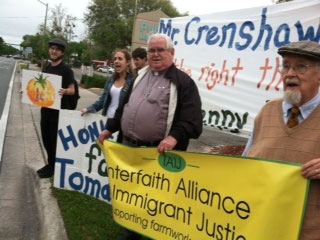
At least 40 people protested at the Publix at the corner of University Avenue and 34th Street as part of Farmworker Awareness Week. Photo by Phil Kellerman.
by Richard K. MacMaster
One week in early Spring, we remind ourselves that we depend on the farm workers who plant and harvest the fruits and vegetables we eat every day of the year. Theirs is the most hazardous, worst paid, and most essential job in the United States. Over the past century, natives and immigrants—Bahamans, African Americans, Appalachian whites, Jamaicans, Mexicans, Haitians, Guatemalans and Salvadorans—have followed the harvest from South Florida to Michigan, living and working in oppressive conditions, not infrequently held in debt peonage or slavery by labor contractors.
Farm workers have made remarkable gains in the last few years. The Fair Food Agreement negotiated by the Coalition of Immokalee Workers with 95 percent of Florida tomato growers and a long list of big tomato buyers is one outstanding example. Buyers and growers agreed to an extra penny a pound for the workers and better working conditions, including an end to sexual harassment. But these real gains are fragile, as long as some growers and some buyers refuse to sign. Within the past year, Trader Joe’s and Chipotle signed the agreement, but Publix and Wendy’s still refuse to even talk with farm worker delegations.
Better wages and working conditions secured by United Farm Workers, Farm Labor Organizing Committee, as well as Coalition of Immokalee Workers are threatened by some versions of a Guest Worker program under consideration in Congress that will not assure the same wage scale and working conditions as U.S. farm workers or permit portability, so that a worker is free to leave an employer who does not live up to their contract.
Growers as well as workers in Immokalee had a narrow escape when the U.S. Department of Commerce refused recently to allow Mexican tomato growers to undercut Florida growers by eliminating fair labor standards, but lobbyists for Wal-Mart will be back pushing for this change.
Farm Worker Awareness Week is not a time to be sentimental about farm labor. It is a call to action! They need all the allies they can get!
Gainesville Interfaith Alliance for Immigrant Justice joined with Samuel Proctor Oral History Program at UF for a panel discussion on “The Human Rights of Farm Workers in American Life” at the downtown library on April 3. Nico Gumbs, youth and young adult (YAYA) organizer, and Dr Sam Trickey, board member, both representing National Farm Worker Ministry, spoke of the real life situation of farm workers and their struggle to assert their rights. UF students Scott Kraff, Anna Jiminez, Genesis Lara, and Isht Vatsa shared stories of young activists from Student Action with Farm Workers in the frontlines of efforts to improve wages and working conditions.
Sam Trickey and other IAIJ members raised concerns about proposed Guest Worker programs at Congressman Ted Yoho’s town hall on April 4.
An effort was made to provide information about farm workers to all UF students, faculty, and staff with materials distributed in dorms and classroom buildings. UF students in CHISPAS presented a “Theatre of the Oppressed” performance on April 4 depicting modern-day slavery, poor working conditions, and sexual harassment.
More than fifty students and activists picketed Publix at SW 34th Street on April 5 calling on the supermarket giant one more time to at least meet with representatives of the men and women who harvest the tomatoes they sell. Father Les Singleton of the Episcopal Church of the Mediator in Micanopy made the case for the Fair Food Agreement at the rally and in a segment of TV-20 News.
UF Institute of Hispanic-Latino Culture closed the week with Cesar Chavez and Dolores Huerta Day of Service on April 6, providing opportunities to learn more about their work and legacy and follow their example in organizing for justice for farm workers and others here in Gainesville and Alachua County.
